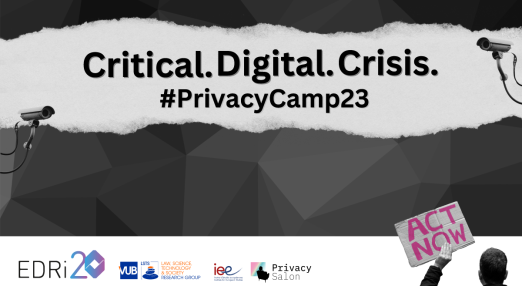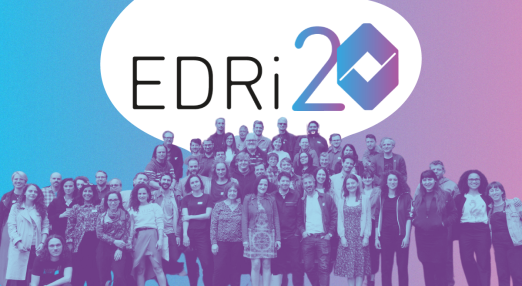Information democracy
Powerful companies and governments control the way the internet and new technologies are deployed. These actors blur the lines on corporate power in ways that have tremendous impact on people and democracies. The dominant business model of ‘Big tech’ platforms is based on surveillance, polarization and power imbalances. This ‘surveillance capitalism’ has had a global impact on democracy. For example, state and private actors can use the internet and technologies to spread political disinformation, to manipulate electoral results, to attack human rights defenders and to limit civic space.
Filter resources
-

EDRi-gram, 15 March 2023
Last week, on International Women’s Day, EDRi’s Sarah Chander and Claire Fernandez were honoured as leading voices for change in the European Union and tech and digital rights space. Join us in celebrating them and all women! In this edition, amongst other digital rights updates, check out our position on the proposed European Health Data Space. This attempt by the European Union to better use health data could come at the cost of patients’ right to privacy and consent. You can also catch up with your favourite #PrivacyCamp23 sessions by reading the summaries below or watching the recordings online.
Read more
-

#PrivacyCamp23: Event summary
In January 2023, EDRi gathered policymakers, activists, human rights defenders, climate and social justice advocates and academics in Brussels to discuss the criticality of our digital worlds. We welcomed 200+ participants in person and enjoyed an online audience of 600+ people engaging with the event livestream videos. If you missed the event or want a reminder of what happened in a session, find the session summaries and video recordings below.
Read more
-

EDRi-gram, 1 March 2023
In this edition of the EDRi-gram, we celebrate the success of EDRi’s member in the Czech Republic against the use of Google analytics in state services. We are also exploring the consequences of internet restrictions for people imposed by the Turkish government to silence criticism. You will also find the Stop Scanning Me movement’s recently launched petition enabling people to fight against the European Union's attempt to scan every move we make online. Join us!
Read more
-

EDRi 2.0: The European Digital Rights network turns 20
This year, EDRi turns 20, marking two decades of building a movement of NGOs, experts, advocates, technologists, academics and impacted communities. Together, we have been defending and advancing digital rights across Europe. Read about our 20-year impact below and join us in celebrating our anniversary.
Read more
-

EDRi-gram, 16 February 2023
In this edition of the EDRi-gram, we invite you to join us in celebrating EDRi’s 20th birthday by reading our impact journey and sending us your wishes and vision for the future of digital rights. In our digital rights news updates, we are looking at the Serbian government’s second attempt to legalise biometric mass surveillance. We are also exploring how TikTok’s new feature will use your emotions to make even more profit.
Read more
-

EDRi-gram, 1 February 2023
In this first EDRigram edition of 2023, we want to take a look back at what we collectively achieved in 2022. Together, we mobilised people and organisations in key moments and continued to strengthen our network and to contribute to the design of a decolonising programme for the field. We are also exploring why the European Commission's blocking obligations for internet services providers in the context of addressing the spread of child sexual abuse material online are impossible. Stay tuned: Today, the European Parliament is voting on the regulation on the transparency and targeting of political advertising proposal which aims to tackle data-driven vote manipulation.
Read more
-

European Parliament approves a timid online political advertising proposal
Tomorrow, 2 February, the European Parliament will vote on the regulation on the transparency and targeting of political advertising proposal in plenary. Although this regulation intended to restrict the use of personal data to target online political advertisements, important proposals to tackle the root causes of data-driven vote manipulation were watered down during the discussion in the Parliament.
Read more
-

Policy Statement on article 17 of the proposed European Media Freedom Act
EDRi and our members Access Now, ApTI, Article 19, Citizen D, EFF, EFN, IT-Politisk Forening, Panoptykon, Vrijschrift, Wikimedia Germany alongside other organisations are calling to reject Article 17 in its current form altogether in the EMFA.
Read more
-

Looking back at 2022: Protecting and advancing digital rights in times of crisis
In moments where we should be urgently tackling the climate crisis and working towards peace and justice worldwide, state funds and efforts seem to reinforce militarisation, fuel the climate crises and injustice. In response to increased surveillance and control practices coming from governments and private companies, EDRi members and partners have put forward a vision in which people live with dignity and vitality. What have we collectively achieved in 2022?
Read more
-

TERREG implementation in Romania: the Intelligence Service wants to become the police officer, prosecutor, judge and supervisor of the bailiff
An online publication discovered that another law proposal was used as a "vehicle" by the Senate Committee on National Security to propose new changes of the law for the TERREG implementation in Romania.
Read more
-

EDRi-gram, 14 December 2022
192 organisations and individuals call on the EU to better address the harms of Artificial Intelligence in the AI Act when used in the context of migration. We also celebrate our members' win as, thanks to their complaints, the EU watchdog has found that the European Commission has failed to protect human rights from its surveillance aid to African countries.
Read more
-

EDRi-gram, 30 November 2022
In this edition of the EDRi-gram, we share with you how the #ReclaimYourFace celebration in Brussels went. 20+ activists from across Europe came together to reflect on a wide range of decentralised actions that made the campaign a success. We're also looking at the joint action of 100+ organisations, calling on the European Parliament and Council to enable a more sustainable use of electronic products and devices with a universal right to install and run any software on any device.
Read more
